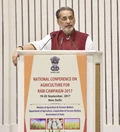
India has continued its impressive streak of increasing food grain production, marking a significant milestone in the agriculture sector. Secretary of Agriculture and Farmers Welfare, Manoj Ahuja, made this announcement during the inauguration of the National Conference on Agriculture for the Rabi Campaign 2023-24.
According to Manoj Ahuja, based on the 3rd Advance Estimates for the year 2022-23, India's food grain production is estimated to reach 3,305 lakh tonnes. This figure represents an astounding increase of 149 lakh tonnes compared to the previous year, 2021-22. Remarkable records have been set in the production of rice, maize, gram, pulses, rapeseed and mustard, oilseeds, and sugarcane. Notably, the production of pulses and oilseeds reached an all-time high, with estimates of 275 lakh tonnes and 410 lakh tonnes, respectively, for the year 2022-23.
Secretary (DA&FW) highlighted that over the past eight years, India's total food grain production has surged by 31%, rising from 251.54 million tonnes to 330.54 million tonnes. This upward trend has been mirrored in the production of oilseeds and pulses, bolstering the country's agricultural sector.
Furthermore, India's agricultural exports, including marine and plantation products, have surpassed USD 53.145 billion for the year 2022-23, reaching the highest level ever achieved. This significant achievement in the past two years aligns with Prime Minister Narendra Modi's vision to improve farmers' income and the country's agricultural prowess.
Collaboration with state governments is crucial to ensure the supply of critical inputs and promote the adoption of innovative technologies to boost crop production and productivity. The government's priority lies in agro-ecological-based crop planning, emphasizing the need to shift from excess commodities like rice and wheat to deficit commodities like oilseeds and pulses, as well as high-value export-earning crops.
The agenda for crop diversification and self-sufficiency in pulses and oilseeds was set during the 1st National Conference of Chief Secretaries at Dharmshala, chaired by Prime Minister Narendra Modi. The ongoing conference seeks to advance these objectives further.
Millets played a significant role during India's G20 Presidency, featuring in gift hampers, exhibitions, and meals during the International Year of Millets (IYM) 2023. A visit by the spouses of G20 leaders to the Indian Agricultural Research Institute (IARI) campus in PUSA on September 9, 2023, showcased millet startups, farmers, and live cooking demonstrations.
India has set ambitious national targets for total food grain production in 2023-24, aiming to reach 3,320 lakh tonnes, with the Rabi season contributing 1,612 lakh tonnes. Additionally, the share of Rabi crops in pulses is targeted at 181 out of 292 lakh tonnes and 145 out of 440 lakh tonnes for oilseeds. Strategies include expanding cultivation through inter-cropping and crop diversification, increasing productivity through the introduction of high-yielding varieties, and adopting suitable agronomic practices in low-yielding regions.
Mustard production has witnessed a remarkable 37% increase over the past three years, climbing from 91.24 lakh tonnes to 124.94 lakh tonnes, with a 7% increase in productivity from 1331 to 1419 kg/ha. The area under rapeseed & mustard cultivation has also grown by 28%, from 68.56 lakh ha in 2019-20 to 88.06 lakh ha in 2022-23. This achievement can be attributed to the concerted efforts of the farming community and state governments and is helping to address challenges in palm and sunflower oil imports.
During the conference, various technical and input-related issues for the Rabi season were discussed in detail. Secretary of Fertilizers, Rajat Kumar Mishra, emphasized the importance of timely fertilizer supply and shared steps taken by the Fertilizer department to ensure this. Dr. Himanshu Pathak, Secretary (DARE) and DG, ICAR, highlighted the need for adopting climate-resilient practices, presenting a global perspective on climate change and adaptation strategies. The NICRA team shared India's experiences in combating climate change and identified climate-resilient technologies for different agro-ecological regions.
The conference also addressed concerns about the significant yield gaps in crop production compared to improved technologies. Smt. Shubha Thakur, JS (Crops & Oilseeds), laid out a vision for the next five years, aiming to make India self-sufficient in pulses and oilseeds. This vision includes achieving a target of 325.47 lakh tonnes of pulses by 2025 and implementing special projects such as inter-cropping, targeting rice fallows, and expanding cultivation in high-potential districts and non-conventional regions. These efforts are expected to increase domestic production of annual edible oilseeds from the current level of 362 to 541 lakh tonnes and edible oil production from 85 to 136 lakh tonnes by the end of 2025-26. This renewed focus aims to reduce import dependency from 56% to 36% within the next five years.
The National Conference saw the active participation of Additional Secretary (Agriculture) and senior officers from DA&FW, ICAR, and various state governments, reaffirming India's commitment to sustainable agricultural growth and self-sufficiency in essential commodities.











